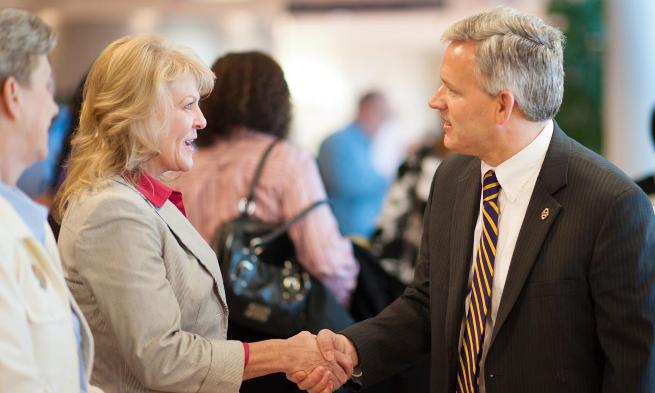A new national model?
News
Why is Madison important to you? Why did you choose to attend, teach or work at JMU? Why are you committed to JMU? Why do you volunteer your time or invest your resources in the university? How might we improve? Why is Madison uniquely suited to address the most pressing challenges of our society and our world? In short, why Madison?
As many of you know, this past semester, I met thousands of JMU students, parents, alumni, faculty and staff members, and friends of the university during the “Why Madison?” Presidential Listening Tour. As we work together to elevate JMU even further — from the regional to the national stage— it’s important for all of us to know the answers to “Why Madison?
No matter how committed to learning a community might be, without engagement there is no cultivation of human interconnectedness.
So far on this tour I have met with the JMU Faculty Emeriti Association; staff from University Studies and the College of Arts and Letters, Centennial Scholars and their families; staff and students from the Center for Multicultural Student Services and the Office of Academic Programs; the Honors Council Advisory Board, alumni at numerous cities across the country and students on campus.
It has been most gratifying during the 33 stops of this tour to learn that nearly everyone wants to be engaged. In fact, engagement has emerged as the predominant theme in what I am hearing. No matter how committed to learning a community might be, without engagement there is no cultivation of human interconnectedness. Madison community members are engaged with ideas and with the world.
I also met with faculty and staff members from the Office of International Programs. They say our Study Abroad program encourages us to explore what it means to be engaged citizens. International experiences help us think about our roles as engaged citizens of the world and make us consciously explore the diverse meanings, opportunities and obligations of citizenship. Given that our university is named for the Father of the U.S. Constitution, I want us to be very intentional about exploring those themes from many perspectives, and specifically what it means to be a democracy in the world today. International education will be a vital part of that.
When I meet our outstanding faculty members they tell me it is important to build lasting relationships with students. Faculty emeriti say one of the greatest strengths of JMU has been that professors get to know students as individuals and people. In the classroom, as mentors of research and also through advising, these relationships are a result of time and effort invested by the faculty.
When we talk about JMU — as a hybrid combining elements of the small liberal arts college and the research-intensive university, we must think about that critical balance — in teaching and research, faculty workload and work/life — not by trying just to emulate what another university is doing, but making JMU the best JMU we can be.
Learn how alumni, professors and students are answering the question “Why Madison?” And, learn how the “Why Madison?” Listening Tour sparked Alice Julias (’65) to action. Then it’s your turn to join in the conversation, connect to Madison, read more of my reflections and help us shape the future of our beloved Madison. Share your answers to the question “Why Madison?” at www.jmu.edu/whymadison.
By JMU President Jonathan R. Alger
